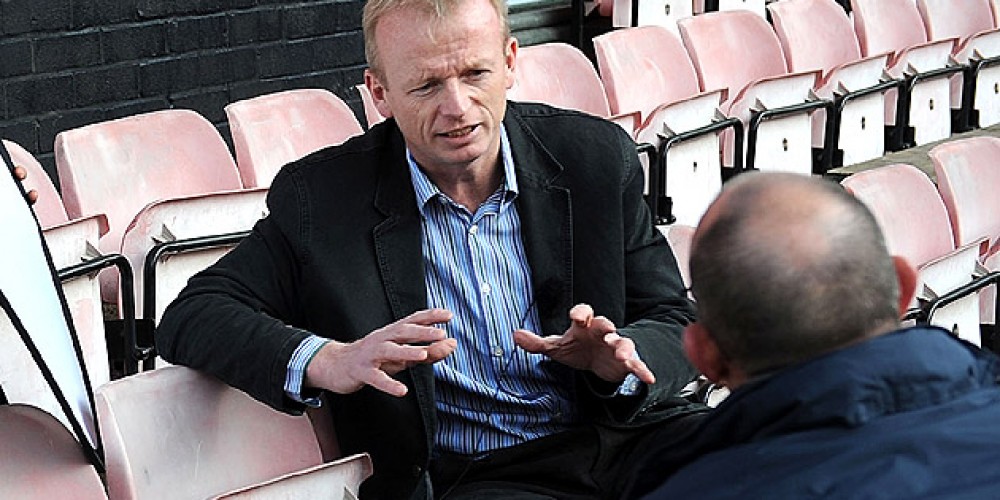Edward Griffiths, CEO of Saracens Rugby Club, is a most unlikely example of a conscious leader. Not because of the man himself, but because usually we think of conscious leadership in the context of business, and who would think that you would find a conscious leader in a rugby club?
But find him we did, as my co-director, Erika Uffindell, and I discovered when we met him in a London lounge for coffee. Griffiths was not particularly identified with being a conscious leader, and quite frankly might even have scoffed a little at the term, but we found in him a rather instinctive consciousness: he knew how to run his business so that it aspired to serve a greater purpose and the common good and he had intuitively implemented practices and policies in the club that easily mirrored some of the best efforts of conscious leadership we usually look to as examples, like John Mackey of Whole Foods Market and Paul Polman of Unilever.
And the results spoke for themselves: prior to 2009, the club had only once been in the top 4 positions in the league. Since Griffiths took over, the club has finished the season in the top 4 positions for the past 5 years. The club finished first in the League in 2013 and 2014, in the latter year securing a record number of points and a record number of wins. This upward trend of results hints at something else that might be going on other than just hard practice.
How has Griffiths been doing it, and what are the parallels with the approaches of conscious leaders in business?
Similar to the way conscious businesses focus on purpose first, from which profit flows, Griffiths has established a culture that is free from the ‘tyranny of the result’. Where other clubs tend to be totally fixated on the result, in the way that businesses can become completely fixated on quarterly earnings and profits, Griffiths has established an environment wherein winning is, essentially, a by-product of treating people in the right way. Players are not treated well because they win – they win because they are treated “unbelievably well,” to use Griffiths’ words. In decoupling winning from the way people are treated, Griffiths has managed to establish a culture where losing is not used as a threat or an excuse for poor behaviour. There’s no anger and no blame. Instead, there is an enormous amount of respect for each other, irrespective of whether or not they have won the game. Consequently, there is a culture of no fear. No one is shouted at and there is no risk of anyone being fired because of a loss. Not one player who the club wished to retain has left Saracens in the five years that Griffiths has been in charge. And the team continues to perform, better and better.
These are hardcore rugby players, some of the toughest specimens of alpha males known to man. Yet they speak about the presence of ‘love’ within the club. What does love mean in the context of a rugby club? “It means looking after the person next to you,” says Griffiths. “It means we trust each other.” In many of the conscious companies researched by Raj Sisodia, author of Firms of Endearment, there is a shift from a culture of fear to a culture of love and care, with a notably positive impact on profit – some 10 – 18%. This is, in a good part, down to conscious leadership.
But this is not hippy, huggy love. It is also a culture of tough love. Together with treating his players extremely well, there are non-negotiable standards. These apply to rugby-specific KPIs like work rate. They also apply to how the players conduct themselves, with honesty, discipline and humility. Tough love includes the potential to ask someone to leave through a completely adult discussion, in terms of what is right and best for that person if they fail to live up to the values of the team and its players and are not a right fit for the club.
These are adult-to-adult relationships and the team disciplines itself if peers fail to live up to their self-determined standards. One of Griffiths’ leadership practices is: “The answer is always ‘yes’”. This, he says, transfers responsibility on to the players and generates ownership and self-respect, so that they can self-monitor within clear boundaries and expectations, trust and, yes, love.
In his approach Griffiths has instinctively mirrored some of the practices in the best conscious companies in the world. Companies like The Container Store, Trader Joe’s, Whole Foods Market and John Lewis combine a connection to an inspiring purpose with clear boundaries and expectations, within which autonomy and self-responsibility can flourish. In some companies that practice conscious leadership, such as Whole Foods Market, responsibility for making decisions about the business is devolved down to the teams themselves.
In another parallel with conscious business, Griffiths also takes a stakeholder-centric view of his club. We know that as business enters the 21st Century, the evolving model of capitalism is becoming more ethical, values-driven and socially responsible to all stakeholders. Griffiths mirrors this in the many ways he includes the wider system in his club, the families of the players, into the way the club goes about its business. Crèches are provided for the players’ wives and children, they are invited along on tours, and free tickets are given to the players’ parents. The team takes away trips to provide the opportunity to form a true bond across the entire family system. Griffiths follows the ‘happy wife, happy life’ principle, except in this case, it equates to happy family system, happy players. And happy players give more to their club, pursue their purpose with greater gusto, and are more loyal to the club and to each other. What about the costs involved? Griffiths says: “We can’t afford not to. Focus on the processes, and the outcomes will look after themselves.” He explicitly trusts his gut-felt approach, and it is paying handsome dividends. His club’s shareholders are happy because a happy team is producing good results.
And then there’s innovation. We know that conscious businesses follow an inclusive and collaborative approach in which contributions from all are welcomed. This breeds multiple innovations. Griffiths has applied innovation in the way he takes care of his players. He recognises that what lies behind every professional rugby player is the fear of ‘what will I do next?’ The club employs two full-time staff to prepare the players for their second career. As a result of this innovation, players are freed from the effects of dread, wondering what might happen to them if they are not good enough and what will happen to them after their careers come to an end. It is a savvy benefit which contributes to settled and motivated players who make focused and successful efforts.
Perhaps the most startling feature of Saracens is that its players are paid between 10 and 20% less than the market rate – and yet they still stay. They are not moving clubs for more money. There is something greater that pulls them towards Saracens – ‘The Saracens Way’ – and other clubs are noticing.
In creating The Saracens Way, Edward Griffiths is an example of conscious leadership using a new model to run his business and create an evolved approach to leading a rugby club, and probably elevating the sport while he is at it. He doesn’t overthink this; didn’t learn it in a business school. He simply does it intuitively, as common sense, and it works.
If Griffiths can achieve this kind of loyalty and these results in the grueling and fickle world of professional sport, it shows that the practices for conscious businesses are transferable to contexts beyond business. What other innovations might be possible? In which other contexts are you aware that conscious business principles are being applied?



Join the conversation